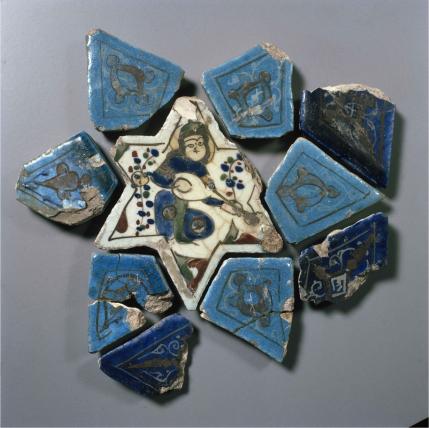Mara Amole*
On November 9th, 2022, Dr. Michael Pifer gave the first talk in the Walter G. Andrews Memorial Lecture Series, hosted by the Turkish and Ottoman Studies Program in the Department of Middle Eastern Languages and Cultures. Dr. Pifer is the Professor of Armenian Language, Literature and Culture at the University of Michigan, a rare position in U.S. academia. In his talk, “Towards Another Literary History” Dr. Pifer explored cross-cultural dialogues in medieval Anatolian literature.
Watch the inaugural Walter G. Andrews Lecture on MELC YouTube Channel through this link.
On the same day, before his talk, Prof. Pifer met with students to share his experience finding his path of study. Dr. Pifer was enthusiastic about hearing student’s interests and projects, offering connections and advice from his own work. It was a delight and inspiration to participate in the variety of conversations that were sparked as the group described their particular passions in Armenian, Turkish, and Ottoman literature and history. He then led a discussion on A Woman Cleaning Lentils, a modern Armenian poem by Zahrad. He read it first in its original Armenian so we could hear the strong rhythm and rhyme; then with a translation we began to sift through the meaning in a lively discussion that flowed over into the corridor of Denny Hall for some time when the next class took the room.
In his lecture on multilingual poetry of Anatolia, titled “Toward an “Other Literary History,” Dr. Pifer began by speaking on how the late Walter Andrews had influenced his own studies. He referred to Andrews’ seminal “Other Selves, Other Poets, and the Other Literary History, And Essay in Three Movements” published in Intersections in Turkish Literature, a collection of essays in honor of James-Stewart Robinson. Arguing that “Other Selves, Other Poets” brought to the fore subjects of diverse cultural interconnection in Ottoman literature, Dr. Pifer illustrated what he described as the medieval literature movement of “parallel poems”: a large body of works in which poets were actively responding to one another, and to heterogeneous audiences, reacting to overlapping cultures in which they were produced, mimicking the styles of old poems to present new meaning.
He introduced an example from the Garib-name, a work of religious advice that consists of a collection of versified stories written in 1330 by the poet Aşık Paşa (1277-1333). This particular work was a response to a similar poem of Rumi’s but altered to reflect the multilingual environment of Anatolia and Paşa’s own ideology and how different forms of difference were accommodated in literature. Included in Garib-name, was a story about an Arab, Persian, Turk, and Armenian who are traveling together, and each of their dialogues is written in their own language. The four desire to feast together, and all request grapes, but because each uses a different word for it, there ensues misunderstanding and an argument. Then comes a polyglot wise religious leader who sees through the divisions of language and provides the grapes – a stand in for God – that the traveling companions desire, and he expounds on the importance of unity. Pifer gives context to the allegory; in an era when Arabic was widely considered “the language of Islam,” Paşa posits through his poem the idea that all languages occupy an essentially displaced position from God, so all these languages can participate equally in spiritual meaning.
The second story Pifer covered was a Middle Armenian poem by Hovhannes Erznkatsi (1230– 1293) about a forbidden romance between Hovhannes, an Armenian Christian, and Aşa, a Turkish Muslim. Both of their fathers are religious leaders in their community and object to their entanglement, with conversion as the condition to marriage. However, it becomes clear that despite the tensions between their respective family cultures and religion, they are already an inextricable part of one another’s world, the communities sharing geographical, linguistic and cultural space; and so, despite the obstacles that arise against their love, neither could be considered entirely “other” in the syncretic landscape of medieval Anatolia. The characters in the story speak a mix of Turkish and Armenian, with the titular characters being already bilingual and well-versed in one another’s mother tongue. However, the story is self-reflexive, playing with the contrasts between stories and reality as Hovhannes recites poetry to establish his position as one familiar to the authorities he is challenging, and tragic rather than merely heretical. In the literary realm, transgressions are forgivable, desirable even. This story was told and retold for many years, and the end of the story varies. In some versions, Aşa converts to Christianity, in others the ending is left unresolved, leaving the reader with a complicated situation to ponder. Pifer invited the audience to consider competing claims for belonging and the interconnected ties linking all these characters together in the same village.
Reading about confluences of cultures and the art that came out of these diverse environments, without exaggerating differences, makes us see that differences of language and culture have not always been seen as they are now. Following the 20th century Armenian genocide, there has been a push in what is now the Republic of Turkey to expunge the cultural connections and overlap of Armenians in Anatolia. Dr. Pifer works to disrupt these constructed dichotomies of modern borders and reminded us that we have lost a lot of culture and dialects to standardization and political delineations, as he learned through experiences living and studying in Armenia and coming across a myriad of dialects outside of the forms officially recognized by the state. Dr. Pifer’s book Kindred Spirits: A Literary History of Medieval Anatolia, published in 2021, explores historical cultural and linguistic mixing and liminality. The study of these medieval works impresses the importance of learning languages, and decentering monolingualism in literature.
*Mara Amole is a senior undergraduate student majoring in Middle Eastern Languages & Cultures and Comparative Literature at the University of Washington.
